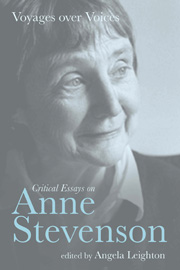Book contents
- Frontmatter
- Contents
- Notes on Contributors
- Acknowledgements
- ‘Making Poetry’
- 1 ‘Voyages over voices’: Introduction
- 2 The Melting Metaphor
- 3 ‘Between us’: Letters and Poems of Stevenson and Bishop
- 4 Mothers, Mirrors, Doubles: Anne Stevenson's Elegies for Sylvia Plath
- 5 Staging Second Thoughts: The Poetry of Anne Stevenson
- 6 ‘Making Poetry’: The Exemplary Anne Stevenson
- 7 ‘A curved adventure’: Romanticism and the Poetry of Anne Stevenson
- 8 The Nature of Anne Stevenson
- 9 Anne Stevenson and the Poetry of Place
- 10 Compacting Time: Anne Stevenson's Poems of Memory
- 11 ‘Not exactly a persona’: Pronouns in Anne Stevenson's Poetry
- 12 ‘To serve a girl on terrible terms’: Anne Stevenson's Writing Selves
- 13 Talking and Singing: Anne Stevenson's Variations on a Rhythmical Theme
- 14 ‘Time will erase’: Anne Stevenson and Elegy
- 15 Observing the Overhearing: The Anne Stevenson Papers in Cambridge University Library
- 16 Bibliography of Anne Stevenson's Published Works
- General Index
- Index of Stevenson's Works
6 - ‘Making Poetry’: The Exemplary Anne Stevenson
- Frontmatter
- Contents
- Notes on Contributors
- Acknowledgements
- ‘Making Poetry’
- 1 ‘Voyages over voices’: Introduction
- 2 The Melting Metaphor
- 3 ‘Between us’: Letters and Poems of Stevenson and Bishop
- 4 Mothers, Mirrors, Doubles: Anne Stevenson's Elegies for Sylvia Plath
- 5 Staging Second Thoughts: The Poetry of Anne Stevenson
- 6 ‘Making Poetry’: The Exemplary Anne Stevenson
- 7 ‘A curved adventure’: Romanticism and the Poetry of Anne Stevenson
- 8 The Nature of Anne Stevenson
- 9 Anne Stevenson and the Poetry of Place
- 10 Compacting Time: Anne Stevenson's Poems of Memory
- 11 ‘Not exactly a persona’: Pronouns in Anne Stevenson's Poetry
- 12 ‘To serve a girl on terrible terms’: Anne Stevenson's Writing Selves
- 13 Talking and Singing: Anne Stevenson's Variations on a Rhythmical Theme
- 14 ‘Time will erase’: Anne Stevenson and Elegy
- 15 Observing the Overhearing: The Anne Stevenson Papers in Cambridge University Library
- 16 Bibliography of Anne Stevenson's Published Works
- General Index
- Index of Stevenson's Works
Summary
Lying awake in a provincial town
I think about poets. They are mostly
men or Irish, turn out old yellow
photographs, may use four-letter words,
stick pigs or marry twice, and edit
most of the books and magazines.
This, the opening stanza of Elizabeth Bartlett's poem ‘Stretchmarks’, comes from her collection The Czar Is Dead, published in 1986, which seems a bit late to be complaining. In the bibliography at the back of Consorting with Angels: Essays on Modern Women Poets, Deryn Rees-Jones lists nearly 150 collections of poetry by women which appeared during the 1980s, and although a few were editions of dead poets, and some neither lived nor worked in the UK, they were all published here. Two decades earlier matters were very different. A. Alvarez notoriously excluded women from the twenty poets featured in his 1962 anthology, The New Poetry. True, he added Sylvia Plath to the revised and enlarged second edition, because her late poems, not published when he first went to press, fitted in with his prescription for the new seriousness, whereas her first collection, The Colossus, published in 1959, did not. But Rees-Jones' persuasive account of the title poem of that collection implicitly shows not only how inadequate Alvarez' response was, but why it was likely to be so. ‘As a poem that enacts mourning,’ Rees-Jones writes, ‘“The Colossus” deals with the loss of a literally small pre-adolescent self and both the loss of the father and the phallus, a necessary act if self-integration is to be achieved.’
- Type
- Chapter
- Information
- Voyages over VoicesCritical Essays on Anne Stevenson, pp. 83 - 97Publisher: Liverpool University PressPrint publication year: 2010

